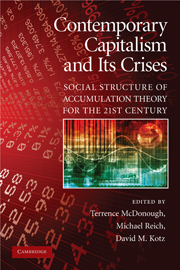Book contents
- Frontmatter
- Contents
- List of Tables
- List of Figures
- List of Contributors
- Acknowledgments
- Introduction: Social Structure of Accumulation Theory for the 21st Century
- PART I THE THEORY OF SOCIAL STRUCTURES OF ACCUMULATION
- PART II GLOBALIZATION AND THE CONTEMPORARY SOCIAL STRUCTURE OF ACCUMULATION
- 4 Global Neoliberalism and the Contemporary Social Structure of Accumulation
- 5 Globalization or Spatialization? The Worldwide Spatial Restructuring of the Labor Process
- 6 Financialization in the Contemporary Social Structure of Accumulation
- 7 Global Neoliberalism and the Possibility of Transnational State Structures
- PART III THE CONTEMPORARY SOCIAL STRUCTURE OF ACCUMULATION IN THE UNITED STATES
- PART IV SOCIAL STRUCTURE OF ACCUMULATION THEORY AND TRANSFORMATIONS OF THE CAPITALIST PERIPHERY
- Index
- References
6 - Financialization in the Contemporary Social Structure of Accumulation
The Worldwide Spatial Restructuring of the Labor Process
Published online by Cambridge University Press: 05 June 2012
- Frontmatter
- Contents
- List of Tables
- List of Figures
- List of Contributors
- Acknowledgments
- Introduction: Social Structure of Accumulation Theory for the 21st Century
- PART I THE THEORY OF SOCIAL STRUCTURES OF ACCUMULATION
- PART II GLOBALIZATION AND THE CONTEMPORARY SOCIAL STRUCTURE OF ACCUMULATION
- 4 Global Neoliberalism and the Contemporary Social Structure of Accumulation
- 5 Globalization or Spatialization? The Worldwide Spatial Restructuring of the Labor Process
- 6 Financialization in the Contemporary Social Structure of Accumulation
- 7 Global Neoliberalism and the Possibility of Transnational State Structures
- PART III THE CONTEMPORARY SOCIAL STRUCTURE OF ACCUMULATION IN THE UNITED STATES
- PART IV SOCIAL STRUCTURE OF ACCUMULATION THEORY AND TRANSFORMATIONS OF THE CAPITALIST PERIPHERY
- Index
- References
Summary
Introduction
Social structures of accumulation (SSA) have life cycles. They are born in an antagonistic relation to the exhaustion of the previous SSA. Conceptually, they may be seen to start in the negative moment of undoing the already weakened institutional accommodations, norms and expectations that had prevailed before and whose internal contradictions can no longer be contained. The institutional solutions of the new SSA allow for renewed accumulation under stable conditions. This does not mean that SSAs should be defined by rapid economic growth (a perspective endorsed by Kotz and Wolfson in Chapter 3), but rather by stability over a period of decades and by the manner in which the institutions that define it form a coherent overdetermining totality (see Chapter 2).
Reacting to the financial excesses and crises of the 1920s, the SSA that was built in the 1930s and that was consolidated in the postwar period constrained the role of finance in the economy. This SSA decayed in the great stagflation of the 1970. The SSA that replaced it, beginning in the early to mid-1980s, soon generated a much greater and ultimately unsustainable role for finance. I concur with the general agreement that a national Keynesian SSA was consolidated in the postwar period and came to an end in the great stagflation of the 1970s.
A global neoliberal SSA can be dated from Ronald Reagan's 1980 electoral victory (of course, not all SSA dating correspond as cleanly with turning point elections).
- Type
- Chapter
- Information
- Contemporary Capitalism and its CrisesSocial Structure of Accumulation Theory for the 21st Century, pp. 145 - 167Publisher: Cambridge University PressPrint publication year: 2010
References
- 19
- Cited by



